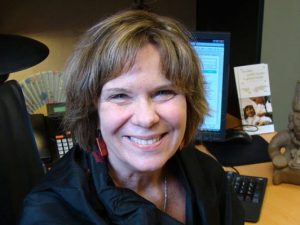Peggy Bentley Reflects on 17 Years as Associate Dean for Global Health
September 1, 2020
Gillings School of Global Public Health

Dr. Peggy Bentley
A Closing Conversation
On September 1, 2020, Dr. Bentley will step down as associate dean for Global Health after 17 years.
WHAT IS ONE OF YOUR FAVORITE MEMORIES FROM YOUR TIME AS THE ASSOCIATE DEAN FOR GLOBAL HEALTH AT GILLINGS?
There are so many wonderful memories it is hard to think of just one. They include the rollout of the Graduate Certificate in Global Health, which began in 2004 and is near completion as we have a new concentration in global health. During Hurricane Katrina, we were asked by Tulane University School of Public Health if we could accept the transfer four of their Hubert H. Humphrey Fellows (a Fulbright Program funded by the US Department of State) because they were being evacuated. Gretchen Van Vliet and I had to scramble to gain university permission, find housing and household goods, and pick them up at the airport to welcome them and help them move into their apartments on Labor Day weekend. They came from Afghanistan, India, Liberia and Malawi and were wonderful ambassadors who enriched our classrooms and campus, Another more recent memory is when the Research, Innovation, and Global Solutions unit organized (of course by Naya Villareal) a competition for constructing gingerbread houses. Of course, Naya and I won.
WHAT DOES “GLOBAL HEALTH” MEAN TO YOU?
This is easy, it is also our tag line and mantra – ‘global health is local health’ and ‘global health is public health’. It is our philosophy that recognizes that there are no boundaries of geography or demography for public problems and solutions. In 2004, one of our first brochures had this as its title and we were ahead of the curve with this definition among other schools of public health. I am happy to say that no one argues about this anymore – but back then it was contested. Certainly, the global pandemic of Covid-19 illustrates exactly how we are all interconnected.
WHAT ARE THE BIGGEST CHANGES YOU HAVE SEEN IN THE FIELD OF GLOBAL HEALTH?
There have been many, including the shift from the terminology and meaning of international health to global health, and right now we are seeing tremendous interest and advocacy for ‘decolonizing global health’ – our students are leading the way. I would also say that more women are recognized as leaders in global health, a field that was largely dominated by infectious diseases and male MDs. We sponsored the Women Leaders in Global Health conferences at Stanford and London, and I attended these with a few of our stellar women faculty at Gillings, There is also much more recognition and acknowledgment for the important role of the social sciences and other disciplines, including law, anthropology, engineering and so on. The SDGs (Sustainable Development Goals) underscore the importance of this approach.
WHEN YOU PICTURE THE FUTURE OF GLOBAL HEALTH, WHAT DO YOU SEE?
There has never been a more important time for global public health. We are experiencing a pandemic like no other for more than 100 years, impacting the entire globe and resulting in morbidity, mortality, loss of livlihoods, greater poverty and food insecurity. If you examine how our school is stepping up to this challenge, through research and service, I think the future bodes very well for continued collaboration across regions, countries, and disciplines. It is hard to imagine where we will be in another 15 or 20 years, but I would say that global public health will be at the center of governance, innovation, and transformation.
WHAT IS SOMETHING BRINGING YOU JOY AMIDST THE GLOBAL PANDEMIC?
I have been walking and swimming almost every day and reading some wonderful books. I have rediscovered the novels by Wallace Stegner, someone who wrote about the west, the environment, culture, family pathos and hope. I continue to meet virtually with students and faculty colleagues and the first thing we talk about is our hair. We must find fun and joy during this time. I heard a woman psychologist on NPR who said, ‘make the most of this time’. So, one of my goals is to bring my Spanish language to a new level of fluency, and one way is to watch Spanish language movies. I just watched a film set in 1988 Peru, where I have worked since that time. It is called Song Without a Name, shot in black and white. It is not an uplifting film, but rather one that reminds me of social injustices and the kind of people and systems that fuel it. It will stay with me a long time.
WHAT ADVICE DO YOU HAVE FOR CURRENT STUDENTS OF GLOBAL HEALTH?
Methods methods methods! Graduate from Gillings with a skill set and a broad understanding of the field will take you far. Skills that employers want the most are how to develop and evaluate programs, create budgets, and the importance of contributing as a collaborative team member. Also, remember that ethics and cultural humility should be the center of all that you do. You are not meant to save the world.
